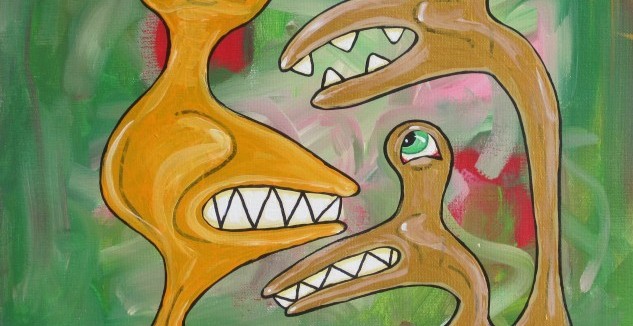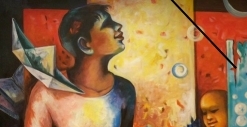My parents always wanted me to marry a Jewish woman. So when they found out that I’m getting serious with someone who isn’t Jewish, they were quite upset. I tried to understand their point of view, but was struggling to do so. I knew that their objection wasn’t religious – having lived all their life in atheist Soviet Russia, they are distinctly (but typically of their generation) secular people, and immigration to Israel didn’t really change that. So what was it that made it so difficult for them to accept? Aside from the usual caution we keep for strangers who don’t fit into our familiar world, there was something that disturbed them on a much deeper level. The answer lied in their past.
Parents’ Past
Soviet Russia in 60s, 70s and 80s, full of contradictions and absurdities, must have been a peculiar place to grow and live in. While the ideological dogma was of a multi-national brotherhood of men and women united by class solidarity, in which race and gender differences were downplayed, the reality of the daily lives was quite different. While my parents’ Jewish heritage has indeed withered (being the first generation to grow without learning Yiddish or celebrating Jewish holidays), their Jewish identity hasn’t dissolved in the communist melting pot. On the contrary, it was molded by an environment, in which anti-semitism, while being officially denied, was commonplace, practiced by the establishment and by regular people in everyday situations.
While being quite different in how they felt and reacted to such occurrences, I’ve heard enough stories from my father and mother to know that both have acutely felt their Jewish descent. My father, being much more thick-skinned was less susceptible to fear and worry. But still, his life experience, including a string of two unsuccessful marriages has taught him the same lesson, as the one learned by my mother, whose much more sensitive nature has led to her instinctive avoidance of public gathering and mobs, where her Jewish looks would potentially make her a target for hostility and aggression.
The lesson being: you have to be with your own kind, if you want support, understanding and safety. A tribal mentality at its core, formed by a life experience in which solidarity with fellow tribesmen comes from shared experiences of discrimination and hostility.
Unfortunately, we humans are pretty bad at adjusting the tough lessons we learned in the past to new realities. Immigration to Israel of 90’s haven’t done much to change my parents’ views. They still felt that we have to stick together, and marrying a non-Jew would make you vulnerable. Who is the threat in this new reality, where Jews are the dominant majority? Not really clear. But habitual fear doesn’t bind easily to rational reflection.
Nation’s Present
Actually, same could be said about most Israelis. While Jews are the dominant cultural and ethnic group in Israel, we still often behave as a persecuted minority, carrying on our tribal genetic memory. The mindset of “everyone is out there to destroy us”, and the belief that our survival depends on our tribal instincts is still very much prevalent in Israel. Of course, the constant political and military conflict with neighbouring Arab nations and a world mostly critical of Israel do little to persuade otherwise.
Israel was founded as a safe-haven for Jews, on the ashes of the Holocaust. Shaped by the idea that “this should never happen again”, generations immigrated and grew here. From a small agricultural settlement, it developed into a high-tech nation and a regional economic and military power.
But despite our accumulated confidence and strength as a nation, we are still chased by ghosts of persecution, we are still suspicious of strangers and we are still critical of marriage outside our tribe. Worse yet, our painful past, instead of making us empathetic to the suffering of others, has made us blind (and morally justified in being so), as evidenced, for example, by our indifference to the situation with African refugees. In our minds, we are still a small tribe trying to survive in a hostile environment, not a powerful economy and a developed society with a responsibility towards minorities living among us.
Our Future
Marriage and two years of living together are behind us. Despite the initial reaction, my parents’ views have changed quickly – usually all it takes to break down psychological barriers is to get to know the person. Learning Hebrew and starting a new career, my wife does her best to accustom to living here, which isn’t really that hard, considering that it’s a small price to pay for our happiness.
But coping with tribal mentality isn’t easy for someone who is so obviously an outsider – my wife’s Asian looks stir enough unhealthy curiosity and glances to make anyone uncomfortable.
In a world in which innovation and global economy increasingly transcend boundaries of nations and races, and cities and corporations compete for educated workforce, lured by high-quality life and freedom, it may be the first time that our tribal instincts get in the way of our future.



You explained the history and mentality very well. Reading these words show the prejudices of human nature. Left unchecked, it leads to more hurt and pain. Over all mankind is sorely in need of divine intervention. I wish the best for you and your wife.
Thank you James for reading it and for the kind words 🙂
I’m glad you and your wife have come through the initial difficulties with your parents. My mother was upset when I married outside the Catholic religion, but I still married a Christian. Her upset was more about her need to control outcomes and others, which is often at the root of prejudices, than it was about me marrying outside my faith.
Even though I am not practicing religion of any kind, I find myself on a very earnest spiritual quest, and I learn from a variety of spiritual writings.
My own family was very critical, demanding and judgmental. It was painful to experience judgment and rejection from your own family.
When I was 10, I visited Poland, and Auschwitz, and the experience left me more sensitively aware of the widespread destructiveness in the human psyche. I have always sought to understand these dark forces. I am beginning to realize we all have them. I’m beginning to also realize that without awareness, the things we reject in others, don’t go away, they go underground. And the reason why they don’t go away is we are more like those we reject than we realize. We don’t like to have reminders of the things in ourselves we are trying to keep hidden from ourselves. It’s some complicated psychology.
I’m happy to say my daughter is good friends with a classmate who is from an Arabic family who are practicing Muslims. She is learning about other cultures and belief systems and she is getting to know you can appreciate the differences in others and still love and care about them.
I encourage my girls to accept and even embrace differences – differences in each other in our own family and differences they see in their friends and in others in their lives.
The more we accept the differences, the more we can look closely and realize they aren’t so different after all.
Great post!
Thank you Casey,
Love reading your comments 🙂
I’m glad your daughter has an opportunity to meet kids from other cultures – children are much more flexible and accepting to ‘others’, once they are given an opportunity to meet and get to know them.
“The more we accept the differences, the more we can look closely and realize we aren’t so different after all” – right on spot!
I generally agree about the tribalism thing, but I think that you didn’t capture an
important point. The alleged problem with marrying a non-Jew is not that it
leads to some form of insecurity but rather that you negate the efforts
of your ancestors to survive as a Jewish nation rather than just a bunch
of individuals. Whether “surviving as a nation” is a desirable goal is
another question.
That’s a good point, thank you for noting this.
Marrying a non-Jew indeed negates our ancestors efforts to survive as a Jewish nation, only when it happens abroad. But in Israel, that’s not the case, because Israeli identity (taken by its non-hostile citizens) effectively substitutes the need for sterile jewish identity, in order to survive as a (proto) Jewish nation.
Think how many friends we have – most of them are children of immigrants from Russia, that aren’t jewish (their mother isn’t jewish), and don’t consider themselves Jewish, but are Israeli to the core (served in army, very patriotic of the country). Are they in any way risking our ancestors efforts?
There is no reason Jewish culture, history and heritage won’t remain the dominant forces in Israel, since it’s hard to imagine how a minority of loyal non-jews would risk that dominance.
My point is that the creation of state of Israel significantly decreased the need to maintain genetic bonds (Jewish men marrying Jewish women) in order to survive as a nation, since genetic bonds are now successfully substituted by societal, political, cultural and local bonds, created by people living together in a relatively free and prosperous society.
So if we want to ensure the future well-being of the Jewish nation, we’ll do better by striving to make Israel a more free and prosperous place (for all Israelies, including non-Jews), instead of enforcing outlived religious rules.